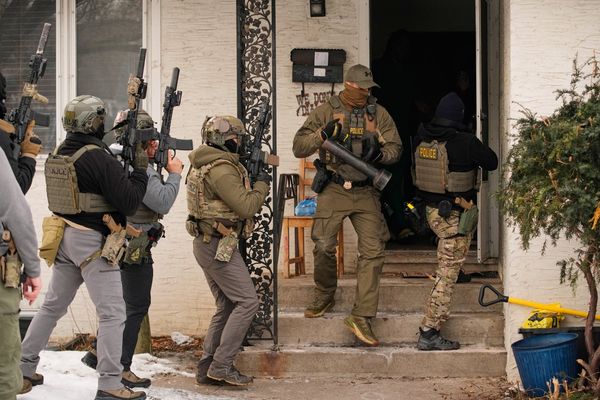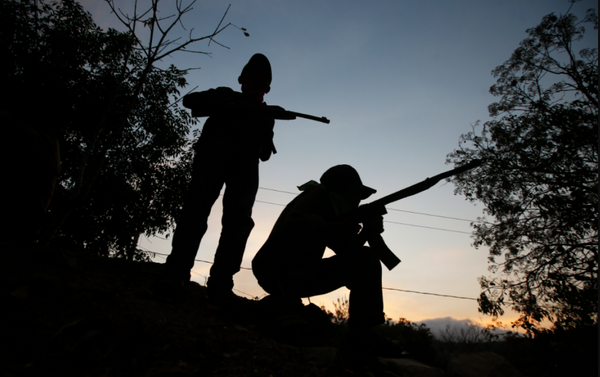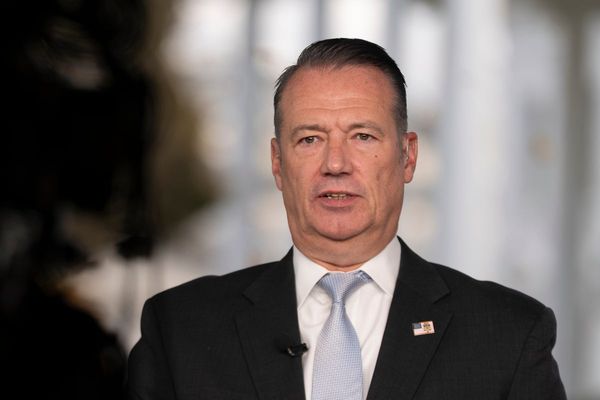
Tracey Emin is curled up on the red sofa of her new home in Margate, with her kittens Teacup and Pancake lolling beside her. “Some critic,” she tells me, “said I was influenced by Matisse. I said, ‘Oh, you mean because of this?’” She raises her right hand and places it behind her neck, adopting the posture of Matisse’s famous Blue Nude. “And I asked, ‘Are you saying that Matisse owns the way that women sit?’”
It can certainly feel that way, given the propensity of female nudes in Matisse’s oeuvre. The same could be said of Picasso, Botticelli and Titian, too. But Emin is now seeking to take back this territory – in spectacular fashion. “The nude, the naked female body, is the big picture,” she says. “It’s archetypal, everybody understands it. It’s like a cave drawing.”
As she speaks, I am reminded of the images I have just watched being hung in the Carl Freedman Gallery, which adjoins her studio and living space in Margate. Inked in black and white, with flows and smears of grey, these startling new nudes are bigger than life-sized, adorning sheets of paper two and a half metres wide. Made with a little help from the biggest silkscreen frame in Europe, they are, I think, her best figurative works yet, their physical features drawn with an anatomical insight and frankness that renders them as shocking as they are beautiful. Unlike Matisse, Emin doesn’t need a model in a Nice hotel room to know a woman’s buttocks, legs, back, tummy and face. “Because it’s me,” she says.
The artist has been painting, drawing and photographing herself for a long time but these latest nudes are her grandest and most honest yet, appearing in a show called A Journey to Death. Depicting pain, fear and a lust for life, they are her response to the bladder cancer she was diagnosed with in 2020, and to the surgery that saved her life but changed her body.

Carl Freedman was one of the names in Everyone I Have Ever Slept With 1963-1995, Emin’s tent artwork that caused a storm at the fabulously controversial 1997 YBA show Sensation, before it was destroyed in a warehouse fire. We go off to lunch at Angela’s, a seafood restaurant on Margate’s Parade; as I scoff clams, they remember how they met at a party in 1991.
Emin was struck by the young writer and curator’s “aura” and they went on to tour the US, with Emin giving readings about her life from a cute little armchair. They decided to reassess their relationship every six months: one night she came home to find him crying in the dark and realised it was renewal day. Or rather, non-renewal. But they are still friends: two years before she recently decided to move back to Margate, he had settled his family and business there.
That’s why Emin’s first exhibition of new art since her illness is happening here – but also because Freedman has some pretty impressive printing equipment on site. Upstairs at his gallery, I see the huge silkscreen she did her nudes with. “If I’m not making art,” she says, “I don’t feel alive. A big part of me will feel dead: I’m not Tracey, I don’t exist. I felt so much better after this work. It’s like, ‘Ah – ah – ah – I’m alive!’”
There is certainly a savage life force coursing through these new works. In one, called Like the Moon You Rolled Across My Back, she crawls naked through a lunar scene, limbs gnawed by pain, her face turned towards us in a melted mask of suffering. Emin has never before drawn or painted her face as much. “It’s not about how I look,” she says. “It’s about how I’m feeling. Some of them are pretty. Some are ugly. Some are really fucked up.”
In The Mistress from Death, she is recognisable, wearing a ruched-up dress that flows outwards across the space. It is her interpretation of a painting by Manet of Jeanne Duval, lover of the poet Baudelaire. But even in this beautiful work, illness pervades, Duval having had polio. Elsewhere, we see a naked figure curled up on a bed. It is called Don’t Tell Me About This Kind of Pain.
“It’s contorted and twisted,” she says, “but I’ve just gone through something quite horrific. You know, if a robot hadn’t done the cutting and sewing, my body would have had scars all over it. I haven’t got scars, I’ve just got holes. My body’s weird now. Down here, it looks odd – but I’m not pulled together by scars, on the outside at least. On the inside I am. The recovery is still going on. It will be two years in July. Recovery takes a really long time.”

Emin has always made art about her physical existence. Once, it may have seemed “narcissistic” – a word still guaranteed to provoke her. “Do people call Vincent van Gogh narcissistic?” But, as she’s got older, her unique approach to self-portraiture has come to seem enduring and brave, especially as she is now directing her unflinching gaze at the aftermath of her cancer.
“That’s all come out in these works: the pain I’m in. Because I get a lot of pain. That’s all just to do with mobility, muscles, everything – no lymph nodes, all of those kind of things. And also the sexual pain as well. I had half my vagina cut away. It’s a big deal. If a guy had half his dick cut off, he’d soon start complaining about it. I also had to have my womb removed and my ovaries, a full hysterectomy. Is this sexy? No, of course it isn’t. Everything’s changed for me. My whole life has changed.”
Yet these artworks are sexy, I say. There is ecstasy as well as agony. One nude is curled up masturbating – never a subject Emin has shied away from but one she depicts here more furiously than ever. “You can be a nun the whole of your life and not have sex and still be really fucking sexy. It’s not about what you do with your body. It’s what you do with your mind, isn’t it? What you do with your hands, your sense of self, self-worth. It all comes out – and I think with this work, it’s come out really strong.”
These are, she says, her Black Paintings, echoing the name given to the scenes of nightmare and madness created by the great Spanish artist Goya after he went deaf. “I had to do something like that. I needed to go into the cave and just sit there for a while in the darkness, and then come out. So I kept thinking I wanted to do black paintings, black on black on black on black.”
This urge began before she was even diagnosed, though. She believes she had a premonition one sunny spring evening, when her entire world suddenly went dark. “It was during the first lockdown, just before the banging of the saucepans for the NHS. It was light, I was sitting in my living room waiting to look out the window and the TV was on – and suddenly it went off, the room went completely dark, and this apparition came towards me. I went, ‘Oh, fucking hell!’”
She still can’t explain the experience. And when she says darkness, I realise, she is being both literal and metaphorical. “There is darkness. For every ounce of light, there is darkness. There’s black holes in space. In every nook and cranny, in the recesses of our mind, there’s darkness. Maybe it’s inside us like the cancer, gnawing away.”

Conversely, though, for every ounce of darkness, there is light. Emin was able to make these powerful new works that defy her illness because of what she is creating in Margate: not just her studios, her home and Freedman’s gallery, which are all joined together, but also a community. An entire side of a street is currently busy with builders. Emin is opening her own art school here in September, with an admissions policy that invites anyone, regardless of age or qualification, to submit a portfolio. As I chew ray wing, I discover I am not just enjoying lunch but also getting a taste of Emin’s social vision – for this restaurant will provide teaching at the catering college she is also creating.
“When I talk about how much poverty there is now,” she says, “I’m talking about people who can’t eat. When I was little, I went through that: no food, no electricity, no hot water. We squatted in a house. Squatted. We didn’t have anywhere to live. And with a single-parent mum. When you’ve achieved what I have achieved coming from that background, speaking the way I do as well, it is like, ‘Fucking hell, I really have done something.’ If I’ve done it, other people can do it, and I’m going to show people they can.”
As she remembers her childhood in Margate, I can’t help wondering what has drawn her back. Through her art, she has told in terrible detail how she was raped at 13 and quit school. You might not think she owed the place anything. She admits that when she first spent a fortnight back here a few years ago, she felt the memories menacing her sanity: “It was almost like I was back in my childhood. And it was so terrible for me.”
But it’s different now that she has come home properly, buying a place in the town. “I feel a sense of freedom. I feel a sense of being Tracey. I like walking down the street. I like the smallness of everything. And the more I go round town, the more I realise there’s lots of it I’d blurred out, lots of things I don’t really remember.”

Emin is not just recreating Margate in her head. There’s a part of town with paving stones, for instance, that would look great if they were not so filthy. When she suggested the community do something about it, people said the council was not interested. “Why wait for the council?” she asked. Margate may not know what’s about to hit it. When I suggest she run for mayor, she says she’s too forthright for politics. “I’d soon be calling someone a tosser.”
Outraged by Partygate, Emin recently demanded the government remove her neon work More Passion from 10 Downing Street because the last thing they need is more encouragement to party. Yet she has no political affiliation. Her utopian mission in Margate is simply local and ethical. As we walk along the street, people come up and greet her, among them the foreman of her building site, who tells me she is doing great things. We pass a sweet shop that she snipped the ribbon to open.
When she helps people, she says, her darkness goes. “The busier I am with responsibility for others, the more chance I have of lifting myself out of this mire of shit that I could be just floating around in – a woman who’s nearly 60, living on her own.” She pauses. “In terms of going out in cities now, everything is so much more difficult for me because of having a bag and everything. It’s not very rewarding or nice. It just feels so much more cosy being at home. Like we’ve just had lunch at Angela’s – that’s good anywhere in the world.”
Emin seems happier than I have ever seen her, creating a new life for herself and others in a beaten-up part of a faded town. But, for all the fine food and the colleges going up brick by brick, it is the art that completes her. “The other night I was painting,” she says, “and I was so happy. I was listening to Stupid Girl by Garbage and started dancing for the first time in two years. Really dancing. On my own. Really dancing. And I’ve had a lot of mobility issues since surgery, like my hips can’t move properly and I’m just kind of stuck. And I started dancing and I was so happy. I felt so fucking good, I felt brilliant. It was the first time in ages I felt, ‘Yeah. Got it back. This is it.’”
Tracey Emin: A Journey to Death is at Carl Freedman Gallery, Margate, until 19 June.







